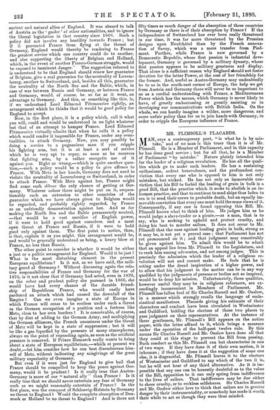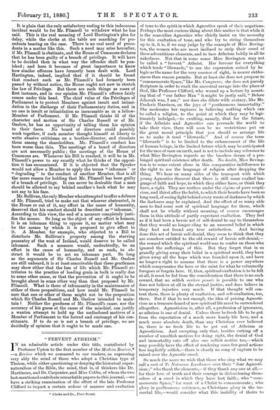MR. PLIMSOLL'S PLACARDS.
MAN, says a contemporary poet, "is what he is by mis- take," and of no man is this truer than it is of Mr. Plimsoll. He is a Member of Parliament, and in this capacity he has done good service ; but for all that, he is a Member of Parliament "by mistake." Nature plainly intended him for the leader of a religious revolution. He has all the quali- ties which go to make such leaders. He has a sustaining enthusiasm, ardent benevolence, and the profoundest con- viction that every one who is opposed to him is not only mistaken, but wicked. He has not only an immovable con- viction that his Bill to forbid the loading of grain in bulk is a good Bill, that the practice which it seeks to abolish is an in- human practice, and that to continue to send ships thus laden to sea is to send their crews to probable death, but an equally im- movable conviction that every one must hold the same views of it. Consequently, if any one is found opposing this Bill, Mr. Plimsoll knows what to think of him. He judges him as he would judge a slave-trader or a pirate,—as a man, that is to say, who is seeking to uphold and protect cruelty, and doing his best to murder sailors. It does not occur to Mr. Plimsoll that the case against loading grain in bulk, strong as it may be, is not yet a proved case ; that Parliament has not yet pronounced on it ; and that judgment may conceivably be given against him. To admit this would be to admit that an appeal lies from Mr. Plimsoll to the Legislature, and to rank him among advocates, and not among judges. This is precisely the admission which the leader of a religious re- volution will not and cannot make. He feels that he is acting under the dread inspiration of a higher power, and to allow that his judgment in the matter can be in any way qualified by the judgments of persons or bodies not so inspired, would be to deny his mission. Unfortunately, these qualities, however useful they may be in religious reformers, are ex- ceedingly inconvenient in Members of Parliament. Mr. Plimsoll has fallen foul of Sir Charles Russell and Mr. Onslow, in a manner which strongly recalls the language of eccle- siastical manifestoes. Placards giving his estimate of their characters and conduct have been circulated in Westminster and Guildford, bidding the electors of those two places to pass judgment on their representatives. At the instance of these gentlemen, Mr. Plimsoll's Bill appears on the notice paper, with the letter affixed to it, which brings a measure under the operation of the half-past twelve rule. By this means Sir Charles Russell and Mr. Onslow have done all that they could at this stage to prevent the Bill from passing. Such conduct as this Mr. Plimsoll can but characterise in one of two ways. If they have done it of their own motion, it is inhuman ; if they have done it at the suggestion of some one else, it is disgraceful. Mr. Plimsoll leaves it to the electors of Westminster and Guildford to say which of the two it is, but he will not hear of any third alternative. As it is im- possible that any one can be honestly doubtful as to the value of the Bill, opposition to it can only spring from indifference to the lives of sailors. That indifference may be due either to sheer cruelty, or to reckless selfishness. Sir Charles Russell and Mr. Onslow either love to think that sailors are in greater danger by their instrumentality, or somebody has made it worth their while to act as though they were thus minded. It is plain that the only satisfactory ending to this indecorous incident would be for Mr. Plimsoll to withdraw what he has said. This is the real meaning of Lord Hartington's plea for delay, while the clerks at the table are searching for pre- cedents bearing on the case. There is no real need of prece- dents in a matter like this. Such a need may arise hereafter, if Mr. Plimsoll is obstinate, and the House of Commons declares that he has been guilty of a breach of privilege. It will have to be decided then in what way the offender shall be pun- ished; and here it becomes of great importance to know how similar offences have formerly been dealt with. Lord Hartington, indeed, implied that if it should be found that conduct such as Mr. Plimsoll's had formerly been passed by without notice, the House ought not now to stretch the law of Privilege. But there are such things as cases of first instance, and in our opinion Mr. Plimsoll's offence fairly comes under this head. The chief value of the Privileges of Parliament is to protect Members against insult and intimi- dation in the discharge of their Parliamentary duties, and in no one is insult or intimidation so inexcusable as in a fellow- Member of Parliament. If Mr. Plimsoll thinks ill of the character and motion of Sir Charles Russell or of Mr. Onslow, he has an opportunity of telling them his opinion to their faces. No board of directors could possibly work together, if each member thought himself at liberty to write abusive criticisms on a brother-director, and circulate them among the shareholders. Mr. Plimsoll's conduct has been worse than this. The meetings of a board of directors are not necessarily public ; the meetings of the House of Commons are. Whenever his Bill is reached, it will be in Mr. Plimsoll's power to say exactly what he thinks of the opposi- tion it has encountered. If it is objected that the Speaker would not allow a Member to apply the terms " inhuman " or " degrading " to the conduct of another Member, that is all the more reason for holding that Mr. Plimsoll has been guilty of a breach of privilege. It can never be desirable that a man should be allowed to say behind another's back what he may not say to his face.
Mr. Sullivan, the only Member who attempted to offer a defence of Mr. Plimsoll, tried to make out that whoever obstructed, in the House or out of it, any effort in the cause of humanity, deserved that his conduct should be described as "inhuman." According to this view, the end of a measure completely justi- fies the means. So long as the object of any effort is human, it is an inhuman -thing to oppose it, no matter what may be the means by which it is proposed to give effect to it. A Member, for example, who objected to a Bill to distribute Mr. Sullivan's property among the starving peasantry of the west of Ireland, would deserve to be called inhuman. Such a measure would, undoubtedly, be an effort in the cause of humanity, and as such, to ob- struct it would be to act an inhuman part. So long as the arguments of Sir Charles Russell and Mr. Onslow are still unheard, it is at least conceivable that these gentlemen may show either that the loss of life which Mr. Plimsoll at- tributes to the practice of loading grain in bulk is really due to some other cause, or that the prevention of it ought to be brought about in some other way than that proposed by Mr. Plimsoll. What is there of inhumanity in the maintenance of either of these propositions, and how could Mr. Plimsoll be sure that one or other of them might not be the proposition which Sir Charles Russell and Mr. Onslow intended to main- tain? Neither the goodness of Mr. Plimsoll's cause, nor the accuracy of his guess at the cause of the mischief, can justify a wanton attempt to hold up the undisclosed motives of a Member of Parliament to the hatred and contempt of his con- stituents. If to do so is not a breach of privilege, we are decidedly of opinion that it ought to be made one.



































 Previous page
Previous page